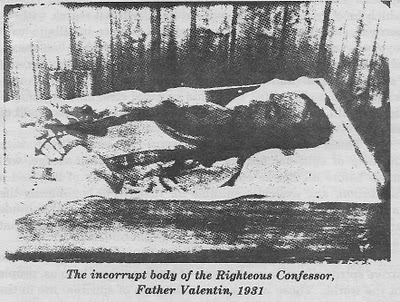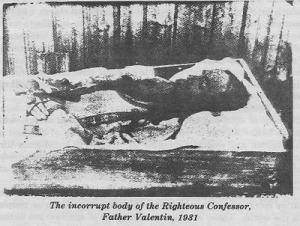Invisible Monasteries! St. Valentine the New Martyr

With God All Things All Things are Possible
by New Martyr Valentine Sventitsky
Source: icliks.wordpress.com
From “Discussions on Selected Passages from the Writings of St. John Climacus”
No one can approach God without withdrawing from the world. By withdrawal I do not mean change of physical dwelling place, but withdrawal from worldly affairs. The virtue of withdrawal from the world consists in not occupying your mind with the world. (St. Isaac of Syria I)
In the name of the Father and of the Son, and of the Holy Spirit’. The Lord said to His disciples:
Enter ye in at the strait gate, for wide is the gate, and broad is the way that leadeth to destruction, and many there be which go in thereat. Because strait is the gate, and narrow is the way, which leadeth unto me, and few there be that find it. (Matt. 7:13-14)
When the disciples were afrighted by the difficulty of the path of salvation and asked the Lord: “Who then can be saved?” Christ looked at them and said: “With men it is impossible but not with God, for with God all things are possible” (Mark 10:27).
I am afraid that the reading of The Ladder of St. John will arouse this fear, this confusion. “Who can ascend the Ladder?” my spiritual children will ask. With men it is impossble; but not with God, for with God all things are possible.
Only by trusting in these words is it possible to enter upon the path of spiritual life. The Lord expects from us an effort according to our human strength, in measure of our human understanding; the rest is given to us by Divine grace, by God’s help.
For this reason, in approaching The Ladder of St. John, let us not be so presumptuous as to set ourselves the task of scaling its heights. The task of the ascetic is to labor his whole life for the Lord. Whatever fruits are produced – these are the result of God’s grace.
The first step of the Ladder demands from us a proper attitude towards “the world”. One must place it in opposition to the self, to draw a certain line of separation, to renounce it. The first word of St. John is “On Renunciation of the World,” while the next, the second step is “On Dispassion.”
“In the very beginning of our renunciation, it is certainly with labor and grief that we practice the virtues. But when we have made progress in them, we no longer feel sorrow, or we feel little sorrow. But as soon as our mortal mind is consumed and mastered by our zeal, we practice them with all joy and eagerness, with love and with divine fire.”
“We must through much tribulation enter into the kingdom of God,” says the Apostle Paul. Certain trials await also those who enter the path of spiritual life. The control of worldly life upon us is too powerful for us to be able to sever the internal chains which bind us to the world, without pain, without regret, without sorrow. But the great experience of the ascetics instills in us a joyous courage. This experience speaks to us of what lies ahead, of what awaits us when we do not stop midway, when, having “made progress” and conquered “earthly wisdom”, we rise somewhat above worldly life. Then this spiritual struggle of renunciation will fill us with joy. Divine fire and fervor will take hold of us…
“Those who have really determined to serve Christ, with the help of spiritual fathers and their own self-knowledge, will strive before all else to choose a place, and away of life, and a habitation, and exercises suitable for them. For community life is not for all, on account of covetousness and places of solitude are not for all, on account of anger. But each will consider what is most suited to his needs.”
This injunction of St John pertains not only to those who strive spiritually in monasticism, but pertains equally to us, people in the world. Those who traverse the path of spiritual life in the world, who renounce it inwardly, who do not leave for monasteries, deserts and reclusion, although under conditions of a worldly life, nevertheless must inevitably make even an outward change in their life. A specific external discipline of life is needed, which must be established by “self-knowledge,” but with the knowledge, counsel, and approval of a spiritual father.
“The man who really loves the Lord, who has made a real effort to find the future Kingdom, who is really pained by his sins, who is really mindful of eternal torment and judgment, who really lives in fear of his own departure, will not love.. anything at all on earth.”
And how could he love it? That heavenly Jerusalem, that eternal Kingdom – if it is revealed to the inner eyes – will immediately illumine the life in the world with a special radiance. That man will see how trifling and insubstantial are the temptations of the world; how vain the concerns. The temporal, the fleeting will become for him like a dream; how terrible then will appear to him sins against the Lord! What great justice will he then behold in the eternal torments awaiting those souls who have come to love the temporal and have renounced Christ! For the eternal, immortal human soul, which accumulates the temporal and perishable, itself plunges into the power of eternal death.
“The man who has come to hate the world has escaped sorrow. But he who has an attachment to anything visible is not yet delivered from grief. For how is it possible not to be sad at the loss of something we love?”
At first it appears that to renounce the world means to choose the way that knows no joy. Earthly happiness seems to him to be the only joy in life. But that is self-deceit. It is the devil’s delusion. What passes for worldly joy devastates the soul; it is the source of despondency, of disappointment and sadness.
“Let us pay close attention to ourselves so that we are not deceived into thinking that we are following the strait and narrow way, when in actual fact we are keeping to the wide and broad way. The following will show you what the narrow way means: mortification of the stomach, all-night standing, water in moderation, short rations of bread, the purifying draught of dishonor, sneers, derision, insults, the cutting off of one’s own will, patience in annoyances, unmurmuring endurance of scorn, disregard of insults, and the habit, when wronged, of bearing it sturdily; when slandered, of not being indignant; when humiliated, not to be angry; when condemned, to be humble. Blessed are they who follow the way we have just described, for theirs is the Kingdom of Heaven.”
Here St. John warns us against delusion. It may seem to a man that he has chosen for himself the narrow path, that he is not walking along the broad, worldly highway, down which walk the perishing multitudes. By distracting the inner concentration, the power of darkness leads him away from the true, narrow path of salvation.”
“Pay heed to yourself!” says St. John. “Pay heed, lest you succumb to this delusion. And here are the signs by which you might verify on which path it is you are walking: the narrow unto salvation, or wandering, rather, along the broad and spacious path to perdition. For, the outward signs: if you subdue your belly with fasting, if you are not lazy in rising for the nocturnal prayer, if you drink less water and do not think of clothing, if you are content to eat only bread – you are walking along the narrow path. While here are the inward signs: if you have cut off your own will, and patiently and cheerfully carry out obediences; if you bear dishonor, mockery, and offenses without murmuring; if you are not angered by slander and humble yourself when you are criticized – then you are going along the narrow path. It is difficult, truly this path is difficult But blessed are those who follow it, “for theirs is the Kingdom of Heaven!”
“Some people living carelessly in the world have asked me: ‘We have wives and are beset with social cares, and how can we lead the solitary life?’ I replied to them: ‘Do all the good you can; do not speak evil of anyone; do not steal from anyone; do not hate anyone; do not be absent from the divine services; be compassionate to the needy; do not offend anyone; do not wreck another man’s domestic happiness, and be content with what your own wives can give you. If you behave in this way, you will not be far from the Kingdom of Heaven.”
This reply of St. John of the Ladder has a special significance in our days.
A desert-dweller of our time told me that a number of desert-dwellers had discussed the question of whether or not they should found a monastery for themselves. After wards, as he was Ascending a mountain, he was granted a vision. An angel appeared to him and said, “This is not the time to build monasteries.”
This was told to me a few months before the war with the Germans.
“Not the time to build monasteries”! Truly this is so! It is time, however, to struggle in monastic asceticism! Today the outward form of monastic life is accessible to very few. And the spiritual life of Christians must now be conducted under the conditions of secular life. They are faced with the task of founding invisible spiritual monasteries with their lives primarily through the podvig of prayer. Few today are able to live behind the stone walls of a monastery which set apart that vain world from this the Christian world which is of God But does this mean that there are no walls which can be built between that world and this?
The inner renunciation of the world – here is the foundation of this monastery. By prayer, by fighting with the passions, by a pure life, by cutting off one’s evil will, by ascetic struggle and labor for Christ – wholeheartedly trusting in the help of God’s grace – raise up the walls of this monastery which is invisible to human eyes. Do not judge, do not lie, love your neighbor, quench all enmity in your hearts – and your inner life will become for you a monastery. Build these invisible spiritual monasteries. Enter therein, leaving behind the vanity of this world. The time for this has come, the favorable season of the Lord! Amen!
(Translated from “Nadezhda”, #5; Possev, 1981. Quotations from The Ladder of Divine Ascent, by St. John Climacus; Holy Transfiguration Monastery, 1979)
(Saint Valentine was imprisoned and finally martyred by the Soviets for standing against their State Church.)






